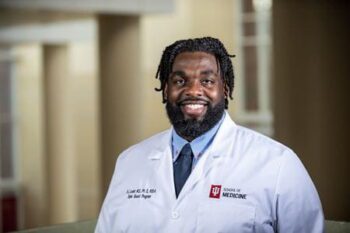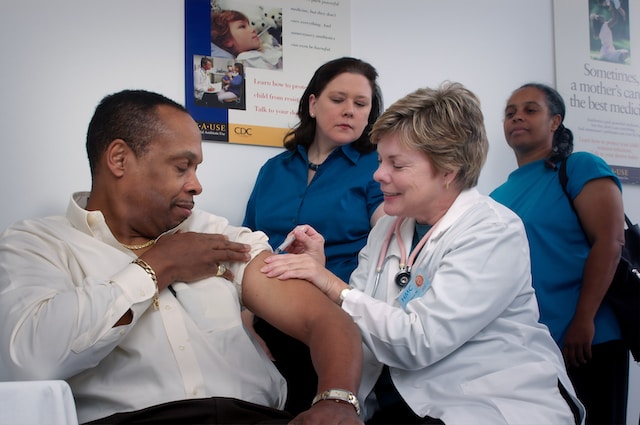Access to quality healthcare is a basic human right, regardless of socioeconomic status, race, ethnicity, gender, or geographic location. Despite this, disparities in healthcare continue to exist and have only magnified social inequities. Equitable healthcare for all people around the United States does not exist. Insurers, pharmaceutical companies, biopharmaceutical companies, physicians, and patient advocates all have a role to play in solving the problem, but it cannot be solved individually.
A multifaceted approach to these inequities is what a panel discussion at the 2023 Biotechnology Innovation Organization (BIO) International Convention sought to address.
15 students, one viral clip – how @drrussellledet is striving for equal opportunities in the healthcare industry. He tells #BIO2023 in #Boston the work @the15whitecoats is doing to breakdown inequities. pic.twitter.com/s3UoFLu7jh
— I Am Biotech (@IAmBiotech) June 8, 2023
Partnerships create innovation

Dr. Russel J. Ledet, Pediatrics/General Psychiatry/Child and Adolescent Psychiatry Resident and Co-Founder and President of The 15 White Coats, began by saying that his work with Genentech and The 15 White Coats allows him “to touch the people in [his] community in a way they have never been touched before.”
“After 400 years of negative impact, change requires something new.”
He knows what the communities need and how to speak with them and is now being given the opportunity, the economic support, and the mentorship to do it. When he thinks about his roots and where he came from, what is on his mind is “the need for an innovative ability to change the way the community sees medicine through a lens that is culturally aligned and culturally smart.”

Charles Henderson, CEO of the American Diabetes Association (ADA), is “excited about a partnership with Genentech, because they also believe in transformation. By working together to address the bipartisan issue of health inequities, we will be able to create a global impact.”
As a patient advocate, Sonali Chopra, Executive Director, Patient Advocacy Relations at Genentech, admitted to past attempts to make change within Black communities. “By creating [a] campaign from San Francisco, the change they expected did not occur, because they did not include the community in the partnership of change. They did not get meaningful feedback to implement their changes. Currently, [Genentech has] a partnership with the American Diabetes Association (ADA) and Dr. Ledet and are asking them what they are doing and what they have already done, as well as inquiring about what they can do to support them and how they can learn from them. They want to learn from past attempts to now succeed and make a difference.”
Companies like Genentech have the financial support and experience to work with organizations like the ADA and The 15 White Coats to not only fund them but also learn from them and do better together.
Trust is built through community care
Brian Jones, Senior VP, General Manager at In Reach Network, stated, “In Reach Network has a commitment to share stories from the community to tell people what is happening in their community.” The story that comes from someone you know is more likely to be associated with action. One of In Reach’s objectives is to “put together a database so that the community is aware and can access available resources.”

Fritz Bittenbender, moderator and Head of U.S. Public Affairs at Genentech, asked, “How can we advance the collaborations across both public and private sectors of healthcare in order to meet the needs of marginalized and underserved communities?”
Henderson responded by addressing the partnership between the ADA and Genentech and their work within Birmingham, AL communities and the UAB Health System.
For example, “85% of blindness could be prevented within communities if diabetes screening is available.” There is a lack of education, awareness, and tools within the communities, and [the ADA] is committed to making a transformational impact. “A Black man is four times more likely to walk into a doctor’s office without a limb versus a white man.” Amputations due to complications from diabetes within minority communities are significant, and prevention is a focus and requires the necessary resources and people to build the trust for change.
Representation opens the door to opportunities
Dr. Ledet voiced the necessity for more Black physicians as well as the importance of presenting opportunities to minority groups. Cultural imagery and transformative change are what Genentech supports and The 15 White Coats represents.

“They are trying to reach two audiences, the thought leaders (websites, YouTube, newsletters, podcasts) and the platform used by this generation: social media (Instagram, TikTok),” explained Jones. He amplified the importance of the story being told by a young black man or woman, who can speak to how their lives have changed and make them an influencer, so they may do the same. Their interest is in supporting and funding the effort to deliver their message successfully.
Policy and access go hand in hand

To highlight the policy perspective, Chopra began with the quote, “Change is inevitable but growth is optional.” Change within health equity or policy in health equity is not apparent. Chopra continued, “Within the 100 counties with the highest medical debt in the United States, 79 of those counties are in the 10 states that have not expanded Medicaid.” Within states that expanded Medicaid, improvements are seen in patient’s access to care, services, and treatments. If we’re trying to change poverty, access to care must exist. Change starts with policy.
Jones concluded, “We do not have a funding problem. It is an awareness, resource, and systemic change problem. Systems need to change to meet the times. The United States healthcare system is treatment- rather than preventative-based. Communication needs to exist to let people know that preventative resources are available to them.” A multifaceted, collaborative approach is how a just and inclusive healthcare system can be built.




